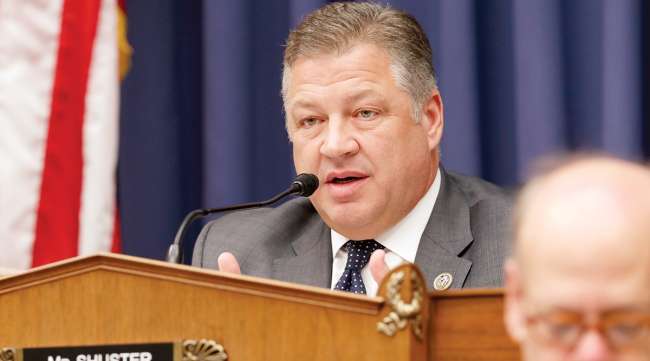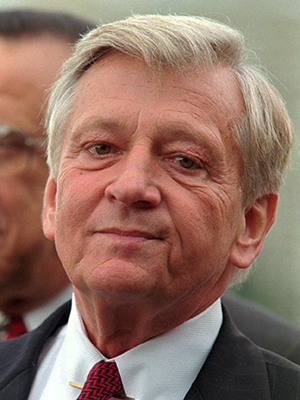Senior Reporter
Funding, Freight Among Retiring T&I Chairman Bill Shuster’s Enduring Priorities

The Shuster congressional dynasty is nearing its end.
After nearly two decades in Congress, Pennsylvania Republican Rep. Bill Shuster will at month’s end vacate his House seat and with it his perch as chairman of the influential Transportation and Infrastructure Committee.
TWO DEALMAKERS: Bill Shuster continued his father's legislative tradition.
His departure from Washington will close a political reign for the family that stretches back to the early 1970s, when his father Bud was elected to represent the same mountainous, rural district outside Pittsburgh that his son would later serve.
In six years leading the transportation panel, the younger Shuster helped advance the 2015 multiyear highway policy law, comprehensive water infrastructure and railroad reauthorizations, high-profile oversight hearings on pipelines, autonomous vehicles and public transit safety, and long-term aviation policy legislation.

The family political reign began with Bill's father, Bud. (Gary Tramontina/Associated Press)
On freight policy, his first major initiative as chairman was establishment of a temporary panel tasked with identifying strategies for enhancing the flow of commerce, a subject that still resonates with him.
“The movement of freight is how the economy operates,” Shuster told Transport Topics on Dec. 4. “The only way to relieve congestion is to increase capacity. Trucks can’t move it all; no one mode can move it all.”
The movement of freight had slowed amid growing congestion on highways over the years. And Shuster responded to the growing concerns from frustrated executives who said their fleets were hampered by traffic.
The panel’s focus on freight concerns included meetings, roundtables and trips around the country and resulted in an extensive list of findings and recommendations. In 2013, the panel determined that Congress should direct the Secretary of Transportation to establish policy specific to freight and designate a multimodal freight network, guarantee public and private investments, dedicate sustainable funding for freight projects of national and regional significance and develop funding and revenue options for freight projects in surface transportation legislation.
The key policy recommendations, in their totality or in some version, would eventually be enacted into law.
Among his regrets, he expressed disappointment that the pursuit of a sustainable funding fix for infrastructure projects nationwide proved elusive.
Shuster’s committee, as well as his counterparts in the Senate, declined to raise and index fuel taxes to bolster the Highway Trust Fund, which relies on revenue from the 24.4-cents-per-gallon diesel tax and 18.4-cents-per-gallon gas tax — measures that have stood unchanged since 1993 and which are insufficient to meet the fund’s needs going forward.
The American people understand if you use the [transportation] system you should pay for the system. It’s something the [Highway Trust Fund] has done.
Rep. Bill Shuster
Republicans and Democrats alike in February failed to back President Donald Trump’s 10-year, $1.5 trillion infrastructure proposal, anchored primarily on private-sector backing. In response, this summer Shuster unveiled a plan of his own that would increase fuel taxes, establish a voluntary vehicle miles traveled program, and impose a tax on bicycle tires. The draft also included a pilot program on public-private partnerships, a federal capital revolving fund and reenactment of coast guard housing authorities.
“The American people understand if you use the system you should pay for the system,” Shuster explained. “It’s something the trust fund has done.”
His Republican colleagues did not fully embrace the proposal, and Shuster’s successor as transportation leader, Rep. Peter DeFazio (D-Ore.), told reporters after the midterm elections he had not seriously reviewed it.
The committee’s next deadline for authorizing highway programs arrives in the fall of 2020, and the funding question will loom large over deliberations for the next multiyear highway policy bill.
Looking back, Shuster acknowledged that federal and state transportation agencies have sometimes failed to keep up with growing consumer demands for goods and services.
When the lame-duck session ends, Shuster anticipates maintaining a presence on the national transportation scene to continue to advocate for infrastructure funding to, as he put it, “try to convince people why we need to do this.”
The temporary panel on freight policy produced meaningful findings that solidified Shuster’s commitment to addressing connectivity concerns for the commercial sector, Jim Tymon, American Association of State Highway and Transportation Officials executive director, told Transport Topics.
“From a congressional standpoint, it served as the foundation around which the committee built its provisions for the surface transportation bill that he did, that later became the FAST Act,” Tymon recalls. “I mean, it was the freight provisions that were built into the House bill, I think, really, a lot of them, got their start from the work that special committee did.”

